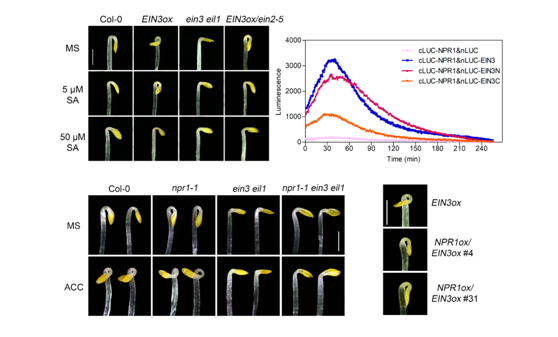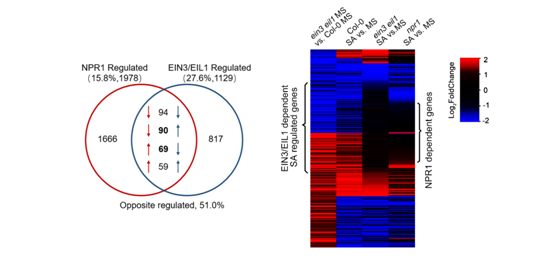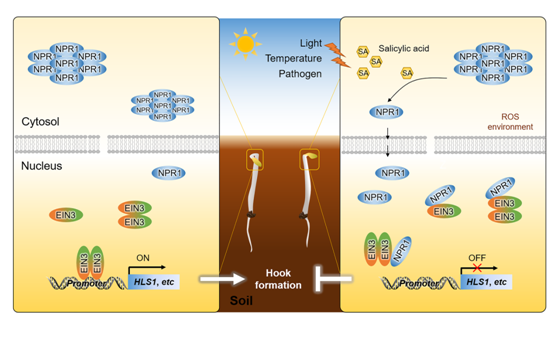Increased crop yields result from hormone regulation
2020-02-02
Farmers and biologists can work closer together to find optimal seed morphology in a quest to improve crop yields and reduce losses due to damaged seedlings. Research from Southern University of Science and Technology (SUSTech) in Shenzhen has determined the hormones that interact and regulate etiolated seedlings growth in a way that ensures their appropriate emergence from the ground for optimal growth after germination of the seeds.
Late last year, Southern University of Science and Technology Peking University Institute of Plant and Food Science (SUSTech-PKU Institute of Plant and Food Science) Chair Professor Guo Hongweiled his team to publish a paper on top biological sciences journal Plant Cell. “Salicylic Acid Suppresses Apical Hook Formation via NPR1-Mediated Repression of EIN3/EIL1 in Arabidopsis”was the title of their paper. The research group of Professor Guo Hongwei has paid significant attention to the regulatory mechanisms of plant hooks over the past ten years. They have found that a variety of plant hormones are involved in the regulation of apical hooks.
Traditionally, seeds find the best environment for germination while buried, but the seedlings must then emerge, or unearth, from the soil to begin the photomorphogenesis process and become plants. One of the challenges for seeds as they progress into plants is young seedlings growth after their germination. The majority of young seedlings meet the stresses of the soil environment. For the dicots, the two cotyledons (two leaves from embryo structures) are closed and bent downwards to form a hook structure, known as an apical hook, which has been proven to protect young tissue and improve the emergence of seedlings from the ground.
The group investigated the role of salicylic acid in etiolated seedlings growth, given an increasing focus on its role in plant growth, development, and abiotic stress (the impact of non-living factors on living organisms), beyond the plant immunity. Moreover, salicylic acid’s role in regulating the growth and development in the early stage of plant seedlings has not been studied extensively.
Their study found that salicylic acid can restrict the formation of apical hooks in etiolated Arabidopsis seedlings, and the regulation process depended on the ethylene signal. Salicylic acid will not change the formation of apical hooks if two crucial transcription factors in the ethylene pathway (EIN3 and EIL1) are absent.

They also found that the NPR1 protein also participated in the development of a salicylic acid-mediated apical hook. NPR1 is an essential component of the salicylic acid signaling pathway and can directly interact with EIN3 protein through the DNA binding region of EIN3.

The research group was also able to determine that NPR1 and EIN3/EIL1 co-regulate various gene subsets that are widely involved in plant growth, plant development, and stress response processes. Their results suggest that interaction between the NPR1 and EIN3 is a new and crucial regulatory point in salicylic acid and ethylene signaling pathway antagonism.

Ultimately the study has shown the mechanisms in which salicylic acid inhibits the formation of apical hooks while also determining the relationship between salicylic acid and ethylene signals. This new set of findings is crucial for crop scientists and farmers in modifying suitable seedling morphology to promote seedling emergence rates.
SUSTech Department of Biology visiting scholar Dr. Huang Peixin is the first author of the article. Department of Biology Chair Professor Guo Hongwei is the correspondent author.
The research was funded by the National Natural Science Foundation of China (NSFC), the National Key Research and Development Program, and the Peking-Tsinghua Joint Center of Life Sciences. The researchers thank Duke University Professor Dong Xinnian and Huazhong Agricultural University Professor Yan Shunping.
Article link:
http://www.plantcell.org/content/early/2019/12/30/tpc.19.00658




